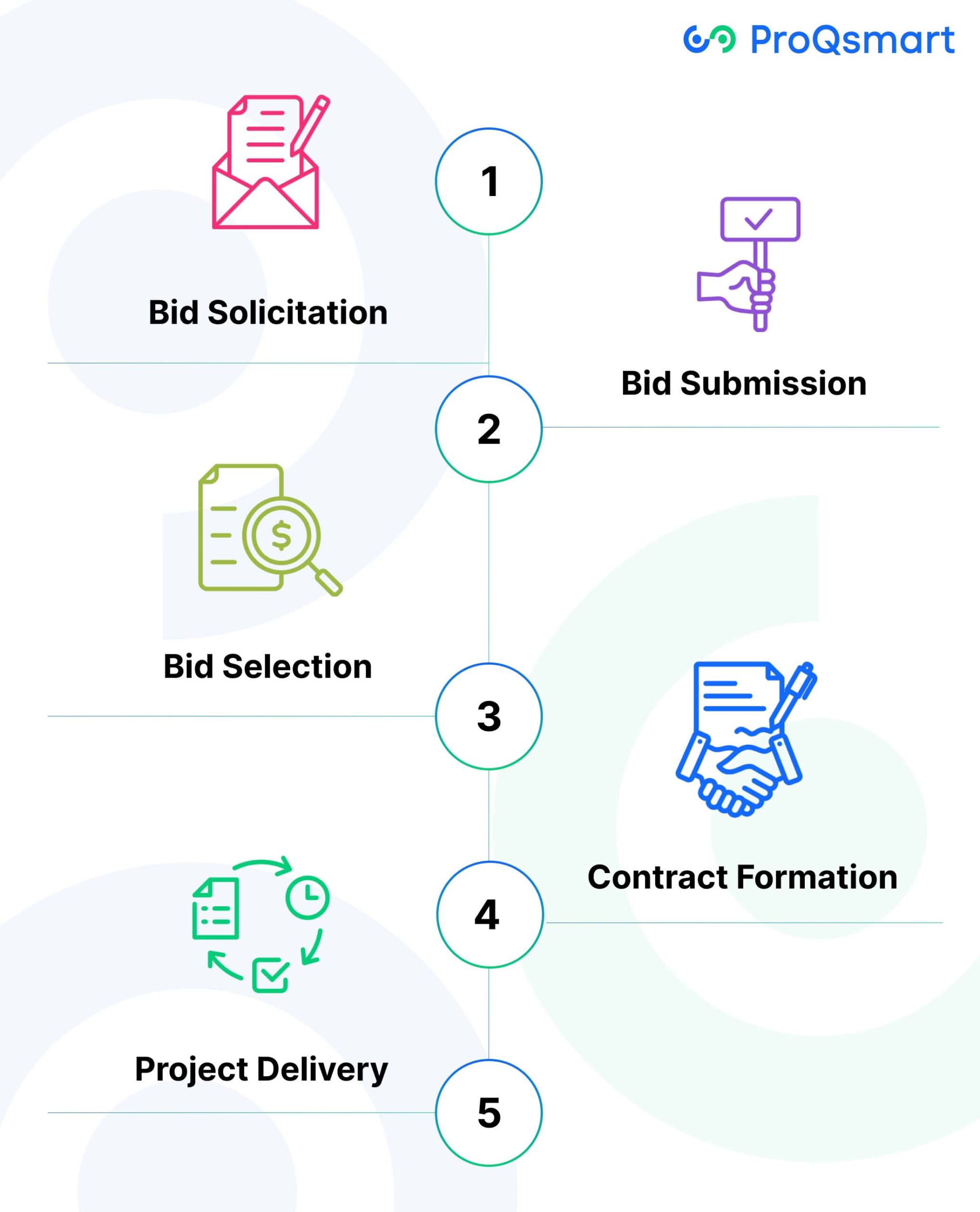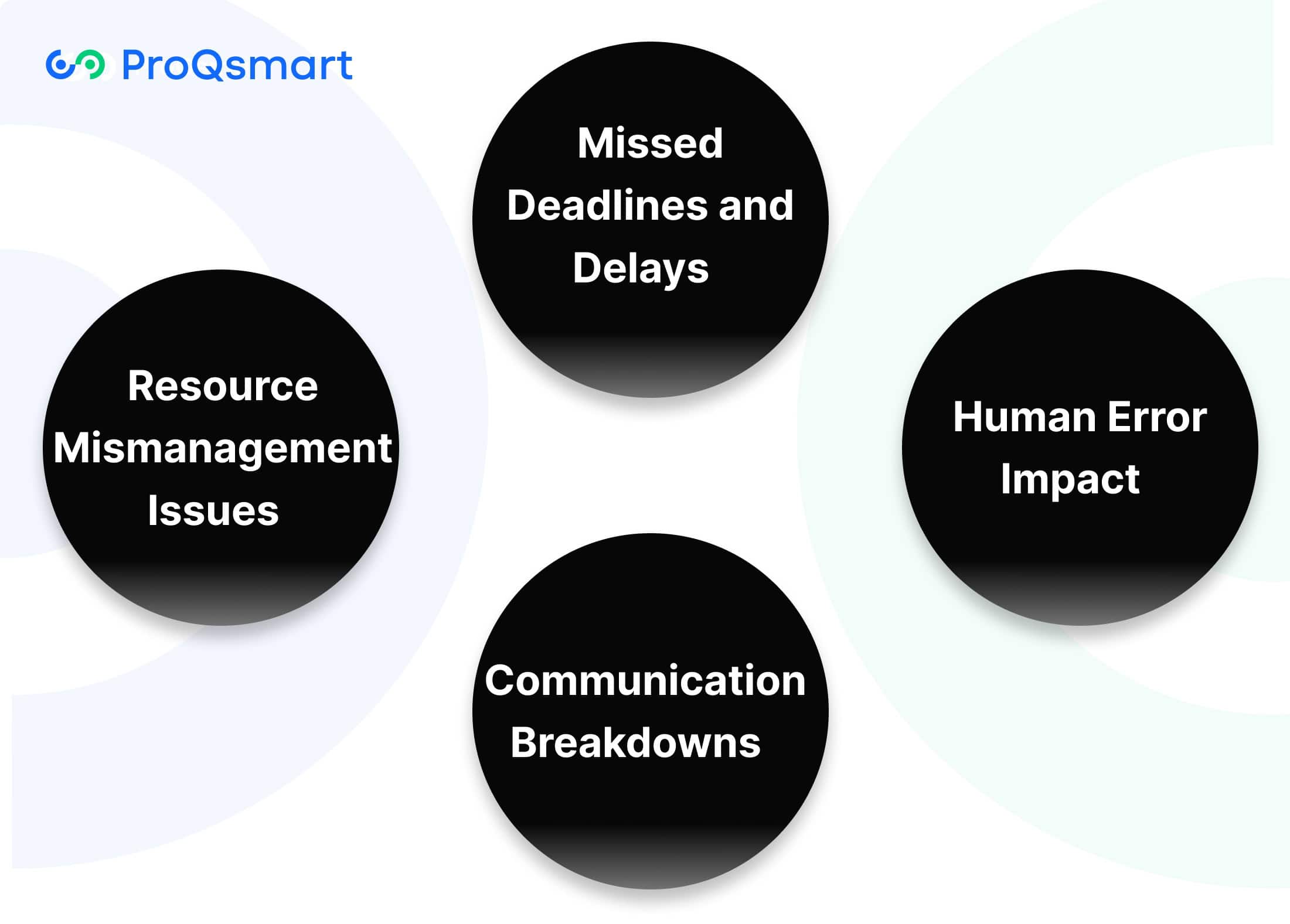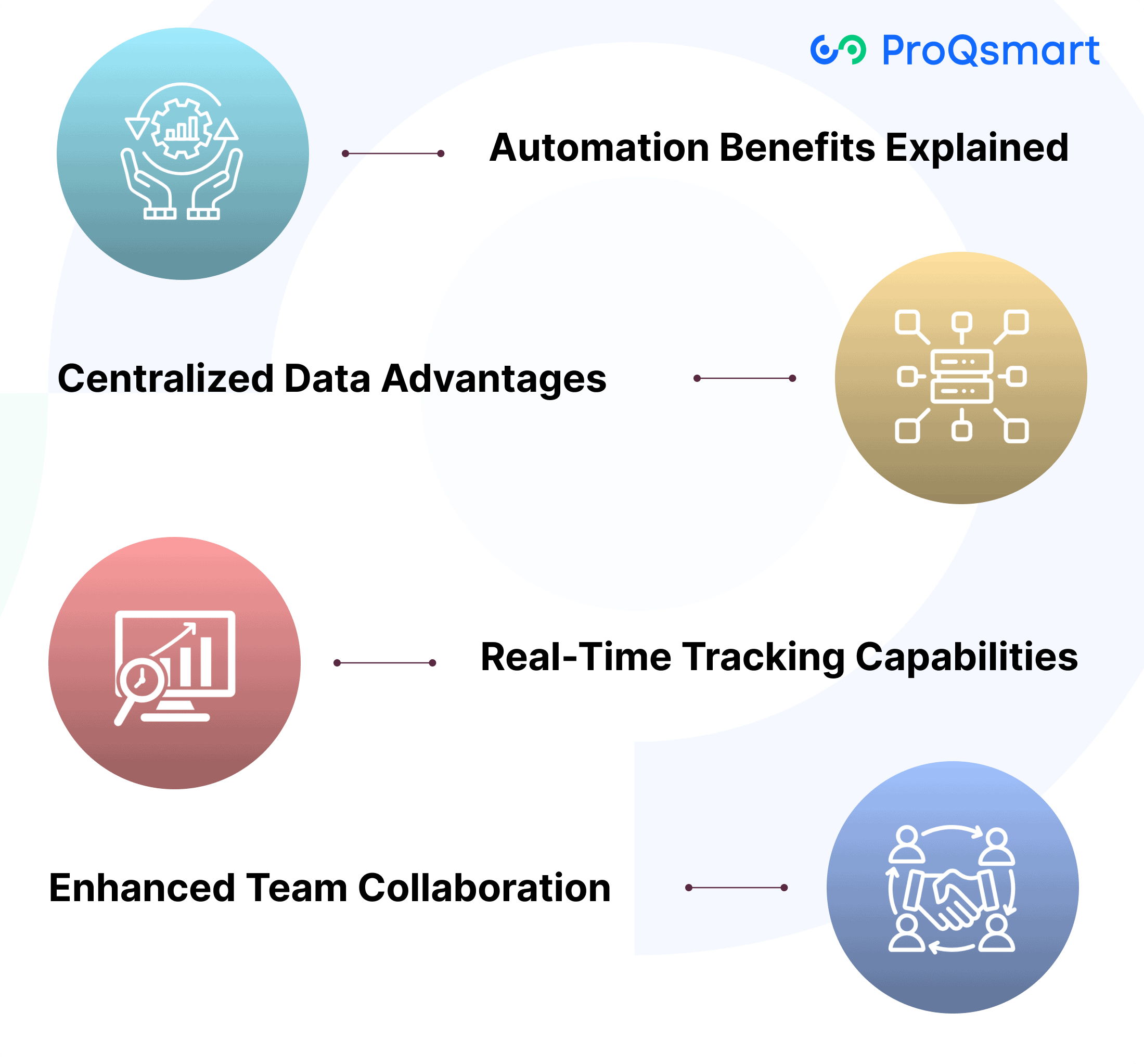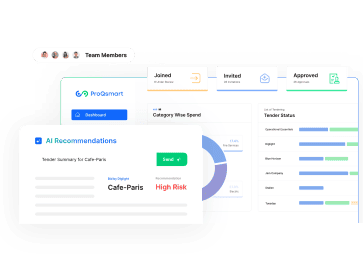Bid management system is the strategic method of managing and aligning bids to win procurement projects. Bid management process maintains precision, compliance, and alignment with overarching business objectives. This includes seamless communication with internal teams, comprehensive review of vendor proposals and detailed record keeping to ensure you get the best possible contracts.
Centralized and effective bid management leads to smarter decision-making, less risky outcomes, and greater cost efficiency by promoting accessibility and collaboration among all stakeholders. By adopting modern tools and methodologies, organizations can improve the evaluation of bids, address regulatory requirements, and optimize supplier relationships.
Professionals who want to win more often—every time the procurement game is played—need to understand these processes. This article will explore some practical strategies to improve your overall bid management process. You’ll learn industry leading practices that drive superior performance.
What is Bid Management System?

A bid management system is a comprehensive software solution. Whether you’re bidding on simple local work or complicated statewide projects, it streamlines and improves the entire bidding process. It allows procurement teams and businesses to efficiently handle tenders by automating key workflows, reducing manual effort, and improving accuracy.
A bid management system combines solutions for proposal development, content libraries, collaboration, and more. This helps to make sure that each part of the issue flows together cohesively. These systems are loaded with important, time-saving features that improve productivity.
They include features like automated proposal templates, centralized storage for bid-related documents, and real-time communication tools, all focused on ensuring effective collaboration between stakeholders.
The system supports the entire bid management process, which typically involves five steps:
-
- Bid solicitation
- Bid submission
- Bid selection
- Contract formation
- Project delivery
Ultimately, a collaborative bid management system is one that will be the most successful.
It creates a shared baseline for project teams and outside partners, encourages transparency and accountability, and ensures consistent messaging. That increase in efficiency has a dramatic impact on success rates. In fact, many of our top performing teams have win rates over 53%!
With advanced features like e-tenders and automated workflows, ProQsmart makes your bidding processes more efficient and powerful. In addition, it tracks supplier performance, tracks budgets, and makes sure everything’s compliant. These capabilities are not just contract-winning tools. From determining project feasibility to better identifying risks to streamlining the management of subcontractors, they are propelling cost savings and operational success.
Challenges of Manual Bid Management

The dangers of managing your own bids manually are very real, particularly for bid managers handling larger or more intricate undertakings. These hurdles can significantly impact productivity, precision, and performance, undermining the quality and transparency of the entire bid management process. Here, we further unpack the challenges of manual bid management and its implications for successful bids.
Missed Deadlines and Delays
Missed deadlines lead to missed opportunities and unhappy customers in the process. With manual bid management, keeping track of all of the timelines can be a headache, not to mention managing several proposals at once. These delays often create a ripple effect, delaying the entire project schedule and increasing costs.
For example, a manual missed bid submission may leave teams scrambling to submit an alternative, leading to a higher likelihood of mistakes. Establishing a deliverable timeline coupled with monitoring systems, such as digital calendars or project management software, helps keep delivery dates on schedule. Automated reminders can go a long way toward staying one step ahead and avoiding that last-minute scramble.
Human Error Impact
Mistakes, like erroneous cost estimates or misunderstood requirements, are damaging to the integrity and compliance of a bid. A seemingly innocuous mistake in the bid process could result in proposals getting dinged, or worse, requiring expensive rebids. Typical examples range from miscalculating labor costs to leaving off key supporting documentation.
To address this risk, it is necessary to conduct detailed internal QA review processes and provide frequent team training. As training programs improve knowledge and skill, the chances of making the same mistake again drops.
Communication Breakdowns
Whether it’s with your internal team or external partners, clear communication is foundational to successful bid management. Confusions and miscommunications can result in subpar proposals or a failure to see what clients are looking for. For instance, if there’s a disconnect on expectations between submitting departments, it can lead to half-baked submissions.
Frequent team meetings and collaboration tools such as shared document workflows help keep efforts aligned and minimize costly mistakes.
Resource Mismanagement Issues
Manual resource allocation indirectly impacts bid quality. When resources aren’t allocated effectively, it leads to overwhelming teams with rushed or low-quality submissions. Evaluating the capacity of your team before chasing bids and developing a plan for managing resources can ensure you put your best foot forward.
Their flexibility in reallocating resources helps them adapt to any late-breaking changes.
How Bid Management Systems Help

Bid management systems are transforming how companies approach the competitive landscape of winning contracts. By leveraging bid management tools that integrate automation, centralized data management, and real-time tracking, bid managers can enhance workflows and collaboration. This strategic approach eliminates wasteful practices, significantly increasing the success rates of winning bids.
Automation Benefits Explained
Automation eliminates repetitive, manual tasks, enabling teams to focus on crafting compelling proposals. Bid management systems powered by AI can pull initial drafts together based on previous data. This automation dramatically reduces the amount of time spent preparing.
ProQsmart’s e-tendering feature simplifies and automates workflows. This reduces the risk of errors and ensures that all components of the bid are consistent with the requirements. Time savings gained help teams turn around RFPs quicker, increasing their chances of winning that much more.
Centralized Data Advantages
A centralized system centralizes all bid-related documents, templates, and past submissions, making sure that important information is available in one location. ProQsmart’s cloud-based platform shines in this arena, making data management intuitive and driving smart decision-making based on real-time data.
By consolidating resources, you eliminate the frantic search through dozens of folders and files and gain back lost time, especially when juggling multiple bids.
Real-Time Tracking Capabilities
ProQsmart’s real-time tracking provides you complete visibility into your bids’ statuses, deadlines, and progress with easy-to-read dashboards. This capability is crucial when managing multiple bids at a time and making sure you’re not missing a beat.
Real-time updates and alerts help teams stay coordinated and proactive.
Enhanced Team Collaboration
Collaboration and communication features available in all-in-one systems such as ProQsmart ensure easy, real-time communication and collaboration among team members. Having a clear, consensus-driven vision and roles, along with constant communication, strengthens collaboration among teams.
This ensures that each piece of the bid works together and dazzles evaluators.
The Role of Technology in Risk Mitigation
Technology has played a huge part in how firms manage bids, especially with advanced bid management tools. Today, risks are proactively identified, tracked, and mitigated across the entire bidding process, enhancing decision-making and ensuring compliance while minimizing potential risks during the bid planning process.
Early Risk Identification
Technology offers sophisticated techniques for spotting risks during the initial stages of bid preparation. Advanced analytics tools, such as those found in ProQsmart, analyze historical data and identify patterns, like recurring public tenders. This enables businesses to anticipate risks and allocate resources effectively.
Conducting risk assessments early ensures that potential financial pitfalls, like investments likely to fail, are addressed before submission. Proactive measures, such as using AI-driven checklists, systematically evaluate risks, ensuring a comprehensive approach to bid preparation.
Compliance Tracking Features
Compliance tracking is essential for effective bid management. Bid management systems that include compliance tracking can help local agencies easily stay on top of compliance with regulations and standards. Functions such as automated alerts inform teams of compliance problems, lessening the chances that a critical detail will be missed.
With auditable sourcing data, ProQsmart gives you the regulatory compliance your organization needs, along with transparency no other solution can provide. Periodic staff training on compliance requirements ensures adherence to compliance is strengthened through regular staff training, leading to a culture of accountability.
Cost Estimation Tools
Accurate cost estimation is the foundation to competitive bidding. Modules such as ProQsmart’s bill of quantities module automate cost calculations, so the team can budget accurately. Tapping into a pool of preexisting project data improves quality forecast accuracy.
More accurate estimates can make bids more competitive and less financially damaging.
Automated Alerts Explained
Automated alerts ensure that teams are aware of critical deadlines and changing compliance requirements. ProQsmart’s customizable notifications help users respond to bid requests quickly, so bid processes don’t miss a beat.
By cutting down on unnecessary delays and manual oversight, these alerts improve safety and overall efficiency.
Optimizing Bid Management Strategies
Optimizing bid management strategies is key to realizing cost efficiency, improving supplier relationships, and accelerating procurement success. Effective bid management skills help you stay ahead of the competition and meet the changing needs of your business.
Leverage AI in Bidding Processes
AI is changing the game of bid management by automating large-scale, complicated processes and increasing accuracy. For example, with an AI-powered platform, you can automatically analyze all bid data, spot trends, and gain predictive insights to make more informed decisions.
These tools further simplify proposal customization, allowing teams to better cater bids to unique client needs, taking less time and resources to complete. E-procurement platforms such as ProQsmart combine AI to streamline e-tenders and reduce complex workflows while maintaining compliance documentation and transparency during the entire process.
Monitor Tender Progress Diligently
Early and ongoing oversight keeps the bids moving forward and on time, hitting key benchmarks in a timely manner. Having project management software in place tracks timelines and manages updates, but keeps everyone involved in the project – especially stakeholders — informed.
This repeatable method reduces redundant lead time and maintains clear responsibility at each step of the bid progression.
Ensure Compliance and Quality Standards
It’s critical in bid management to avoid risk to compliance and quality. Implementation Risk Regular quality checks and team training on compliance standards can go a long way in mitigating this risk.
ProQsmart’s compliance tools provide precise and auditable sourcing data that bolsters bid submissions and compliance with regulatory requirements.
Establish a Repeatable Process Systematically
When bid management skills are standardized with clearly documented procedures, it allows for greater consistency and efficiency. Adopting a culture of continuous improvement enables bid managers to respond to changes in the market and increases long-term profitability.
Refining Bid Strategies with Data
When it comes to bid management, data is the foundation upon which successful, profitable decisions are made. By rooting your strategies in data-backed insights, you’ll save yourself from a world of guesswork and set yourself up for greater success.
Using data provides a double benefit—in addition to finding the right opportunities, it simplifies workflows, so you can focus your time and energy on the most impactful bids.
Leveraging Historical Bidding Data
While reviewing past bidding data isn’t an exact science, it serves as an excellent basis for informing future bidding strategies. Analyzing previous bid results, like win rates, pricing strategies, and competitor activity, provides insights that help refine the strategy.
For example, leading trends in public tenders, which renew every four years, can allow you to better time preparation efforts to align. Tools such as ProQsmart make this much easier by automating data collection efforts and creating extensive repositories.
From monitoring bid history, to evaluating performance trends, to predicting upcoming tenders so you can be proactive, ProQsmart gives you the data to refine your bid strategies. Making sure this data is properly structured and easily exploitable is key to refining and scaling your strategy.
Tracking Key Performance Indicators (KPIs)
KPIs are absolutely critical if you want to measure the success of your bid management process. Metrics such as bid win rates, submission time, and cost efficiency shine a light on where they can do better.
Setting specific goals for each KPI—for example, a goal to increase submission speed by 20%—creates alignment and responsibility. Regular reviews ensure alignment with broader organizational goals.
ProQsmart enhances this process by automating KPI tracking, providing real-time insights that allow teams to pivot quickly.
Adapting to Fluctuating Market Conditions
Agility will be important in responding to evolving market dynamics. Perform ongoing competitive analysis to know where the market is headed, and make bid increases/decreases based on that intelligence.
In fact, Google’s smart bidding takes more than 60 contextual signals like device type and time of day into account to determine the best way to optimize desired outcomes.
ProQsmart’s AI-driven tools for dynamic bidding can inform and refine bids in real-time, keeping your strategies highly competitive yet compliant and transparent.
Bid Management Solutions: ProQsmart
ProQsmart’s bid management solutions are tailor-made to simplify procurement operations, enhancing bid management skills through increased accuracy, collaboration, and compliance. By integrating advanced bid management tools and technologies, ProQsmart streamlines the bidding process, ensuring alignment with organizational goals and regulatory standards.
Key Features of ProQsmart
ProQsmart significantly enhances bid management skills by eliminating manual work by up to 80%, automating repetitive processes such as bid submissions, approvals, and tracking. This streamlining reduces the potential for human error, allowing teams to focus more on strategic priorities.
With real-time collaborative tracking capabilities, ProQsmart enables cross-functional internal teams and engaged suppliers to work together seamlessly across centralized platforms, ensuring one source of truth. Collaborative tools like shared dashboards and real-time notifications keep teams aligned on the same goals, enhancing communication and decision-making in the bid planning process.
ProQsmart’s AI analyzes bids, predicts outcomes, and recommends the best suppliers based on performance history. These insights facilitate collaboration among bid teams, empowering them to make data-driven decisions that significantly improve project outcomes.
ProQsmart ensures compliance by ensuring that up-to-date, auditable sourcing information is always available. This functionality makes it easy to follow legal and organizational requirements, minimizing audit-trial risks.
Benefits of Using ProQsmart
By automating workflows and centralizing document management, ProQsmart saves time and prevents issues like lost files or outdated bid versions. Further, its supplier performance monitoring keeps contractors accountable and on track, improving overall project delivery.
Combined with integration to ERP systems, procurement initiatives are even more closely tuned to the overall goals of the organization, forming a cohesive, budget-focused enterprise.
Comparison: ProQsmart vs. Traditional Methods
|
Aspect |
ProQsmart |
Traditional Methods |
|---|---|---|
|
Workflow Automation |
Automated (80% reduction) |
Manual, time-intensive |
|
Collaboration |
Real-time tools |
Delayed communication |
|
Compliance Monitoring |
Built-in |
Manually tracked |
|
Document Management |
Centralized |
Decentralized, prone to errors |
Conclusion
As more sophisticated tools and strategies become available, bid management becomes increasingly intelligent. A smart bid management process reduces the clutter, allows for quicker decision making, and enables capturing of the best-fitting, highest-potential opportunities. Time-saving isn’t the real benefit here—result driving is, with data-driven focus and strategy. Technology has made measuring risk much less risky. The new technology drastically cuts risk and increases accuracy. This reduces mistakes and opens up doors for advancement.
ProQsmart’s easy-to-use solutions provide a new perspective on how to make the bid process smarter, faster, and more compliant, giving you the competitive edge. Streamline your processes, improve your proposal quality, and see the return on investment come to life.
Looking to get more strategic and proactive with your bid management? Book a demo with ProQsmart today and discover how it can help you achieve your goals.




